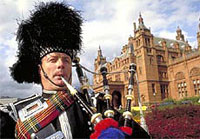The United Kingdom of Great Britain Bursts at the Seams
In 2010, Scotland may raise the issue of its independence. The date of a referendum has not been announced yet, but there is a significant possibility it will be held. It is not ruled out that the referendum will take place this spring, concurrently with the Parliament election in Great Britain.

Scotland is a special place on the map of Great Britain. In the recent years, no conservatives won elections in Scotland. Up to 2007, Laborites kept winning elections. Both Winston Churchill and Margaret Thatcher lost their elections in this country. The last two Laborites Prime Ministers, Tony Blair and Gordon Brown, are Scottish.
2007 was a turning year. In the 2007 Scottish Parliament election, the Scottish National Party won by a narrow margin (31% against 29%). The Scottish National party leader, Alex Salmond, became the country’s Prime Minister. During the election campaign he stated that in 2010 he would hold a referendum regarding independence of Scotland.
Within the last year, Salmond repeated his statement a number of times. “I want Scotland to have the same responsibilities, and opportunities, as similar nations. Until we can use all the economic and financial levers available to every other government in the world, Scotland will always be at a competitive disadvantage,” he stated on September 3, 2009.
On November 30th, the day of Scotland’s patron Saint Andrew, Salmond’s government published white paper clearly describing conditions and other details of the referendum. They suggested three options of Scotland’s future. Option one is preserving the current limited autonomy (solving issues of health care, education and legislation independently of London). Option two is expansion of the current autonomy. Option three is complete independence. Salmond expressed that he would prefer option three.
He said it was time for the Scottish people to say their word about the country’s future. He stated that the country had to become independent to entirely fulfill its economic potential. First of all, it was necessary in order to keep all oil and tourism money in the country.
Will Salmond be successful in his attempts to fulfill his dream of independence even if the referendum is held? It is a difficult question. Scottish public opinion is subject to strong fluctuations, and the pendulum can swing in any direction.
If we look at the results of the last few years, we will see that in 2007, 45% of the population was adamant in their desire to separate from Great Britain, and another 18% supported this idea with certain conditions. At the end of 2009, the picture was different. Only 30% of the population wanted to get rid of London, approximately the same number as in the beginning of the 21st century. It means that Salmond is not guaranteed success .
Probably, the reason for this changein the public opinion was the words of Gordon Brown who became a Prime Minister in 2007. He said that his government would never let nationalists fool the people with the conversations about separation of Great Britain. Brown is Scottish, and he is still highly regarded in Scotland.
Growth of Scottish nationalism could be a reaction to the unpopular Iraq war. Now, when Britain is withdrawing its troops, the issue is less acute. Besides, the voters understand that nationalists have a little over a third of mandates in the local parliament, and the decision regarding independence will not be approved by this organ.
Objectively, Scotland has enough signs of an independent country as is, and none of potentially separatist regions in Europe can compare with it. It has its local currency used along with the British pound, which is sometimes accepted as payment in other parts of the Commonwealth. Neither Flanders not Catalonia can boast their own currency.
Another significant piece of evidence is the country’s own officially recognized football team and the Scottish Football Association that is a part of FIFA and UEFA. Other regions striving for independence, for instance, the Basque Country and Quebec, can only dream of it.
Scotland is economically self-sufficient and it brings in the largest part of British oil and gas. Other developed industries include electronics, whisky production and fishing. Famous lakes and kilts attract tourists from all over the world. The country has significant revenues. Yet, the industry in England is developed better, and profits from tourism are higher. Many Scotts see loss of London’s subsidies as an unacceptable price for the independence, and they will most likely vote against it.
The history is also contradictory. For many centuries, up to 1707, Scotland remained an independent kingdom (in 1707, as a result of unification of the local Parliament with the English one, creation of Great Britain was announced). In the centuries to come, the Scottish governing elite became an integral part of the British governing elite. The best indication is multiple occasions when Scottish would become England’s Prime Ministers.
This people gave the world a philosopher David Hume, writers Walter Scott and Robert Stevenson, and an economist Adam Smith. They created their works in English and became the pride of Great Britain. The Celtic language is almost lost and is spoken by a maximum of 100 thousands of over five million of the population. Even the most adamant nationalists have no intentions of replacing English with Celtic.
It seems that both the supporters and those who oppose the independence of Scotland have trump cards in their hands. The referendum, if held, will be an interesting thing to observe.
Vadim Trukhachev
Pravda.Ru
Subscribe to Pravda.Ru Telegram channel, Facebook, RSS!




